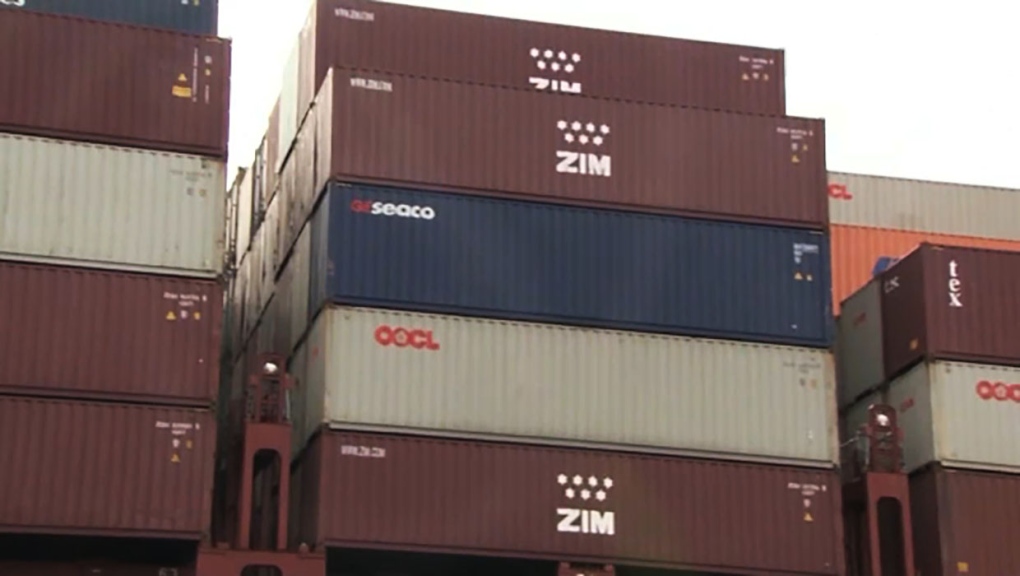Industry leaders meet in Calgary to discuss ongoing supply chain disruption story
The Calgary Supply Chain Excellence forum returned to Calgary Wednesday for the first in-person event since the start of the pandemic, gathering industry leaders to discuss possible solutions to the ongoing supply chain disruption.
Demand for goods and supplies plummeted earlier in the pandemic, yet the supply chain continues to experience backlogs and delays.
Brent Willet, interim president and CEO of Supply Chain Canada, Alberta Institute, said that technological advances may help track shipments and ensure deliveries, but added that multiple factors will improve issues.
"We're not going to be able to solve it all on technology. We're not going to be (relying) on re-skilling current individual employees. We're not going to (be able to) solve it all on immigration, but it's going to be a lot of those components that have to act together," said Willett.
He added that the use of the word "chain" is quickly becoming outdated, and favours the term "supply network" to describe the multiple factors than can play a role.
Since the onset of the global pandemic, ports have experienced weather challenges and labour disputes, and recent political unrest has caused shipping delays.
 Since in the onset of the global pandemic, ports have experienced weather challenges and labour disputes, and recent political unrest has caused shipping delays,
Since in the onset of the global pandemic, ports have experienced weather challenges and labour disputes, and recent political unrest has caused shipping delays,
LABOUR SHORTAGE IMPACT
Willett said Canada's current labour shortage is a major factor.
The federal government has just unveiled its plan to see more workers from overseas come to Canada.
"It's simple to me. Canada needs more people," said Immigration Minister Sean Fraser during an announcement made on Tuesday.
The plan includes increasing the number of new arrivals to 500,000 by 2025.
Last year, just over 400,000 newcomers came to Canada.
Wednesday, Calgary businesses leaders said ensuring the flow of goods and services, and people to make it happen, are critical to a functioning economy.
Chamber of Commerce president and CEO Deborah Yedlin said 63 per cent of chamber business members have reported having supply chain challenges worsen in the last quarter.
"That means you can't deliver what you want to deliver, maybe you can't deliver it at the price you'd like to deliver it. And so those challenges cause you to have to adjust your business on the fly," said Yedlin.
"To be scrambling, as opposed to having some certainty from a supply chain standpoint, is definitely causing businesses some concerns."
Yedlin said the issues span all sectors, but hit hospitality, transportation and warehousing the hardest.
She said it's important for federal immigration rules to allow a direct connection between skilled workers and available jobs, which will also help goods get where they need to go.
CTVNews.ca Top Stories

'They needed people inside Air Canada:' Police announce arrests in Pearson gold heist
Police say one former and one current employee of Air Canada are among the nine suspects that are facing charges in connection with the gold heist at Pearson International Airport last year.
House admonishes ArriveCan contractor in rare parliamentary show of power
MPs enacted an extraordinary, rarely used parliamentary power on Wednesday, summonsing an ArriveCan contractor to appear before the House of Commons where he was admonished publicly and forced to provide answers to the questions MPs said he'd previously evaded.
Leafs star Auston Matthews finishes season with 69 goals
Auston Matthews won't be joining the NHL's 70-goal club this season.
Trump lawyers say Stormy Daniels refused subpoena outside a Brooklyn bar, papers left 'at her feet'
Donald Trump's legal team says it tried serving Stormy Daniels a subpoena as she arrived for an event at a bar in Brooklyn last month, but the porn actor, who is expected to be a witness at the former president's criminal trial, refused to take it and walked away.
Why drivers in Eastern Canada could see big gas price spikes, and other Canadians won't
Drivers in Eastern Canada face a big increase in gas prices because of various factors, especially the higher cost of the summer blend, industry analysts say.
Doug Ford calls on Ontario Speaker to reverse Queen's Park keffiyeh ban
Ontario Premier Doug Ford is calling on Speaker Ted Arnott to reverse a ban on keffiyehs at Queen's Park, describing the move as “needlessly” divisive.
'A living nightmare': Winnipeg woman sentenced following campaign of harassment against man after online date
A Winnipeg woman was sentenced to house arrest after a single date with a man she met online culminated in her harassing him for years, and spurred false allegations which resulted in the innocent man being arrested three times.
Woman who pressured boyfriend to kill his ex in 2000s granted absences from prison
A woman who pressured her boyfriend into killing his teenage ex more than a decade ago will be allowed to leave prison for weeks at a time.
Customers disappointed after email listing $60K Tim Hortons prize sent in error
Several Tim Horton’s customers are feeling great disappointment after being told by the company that an email stating they won a boat worth nearly $60,000 was sent in error.

































